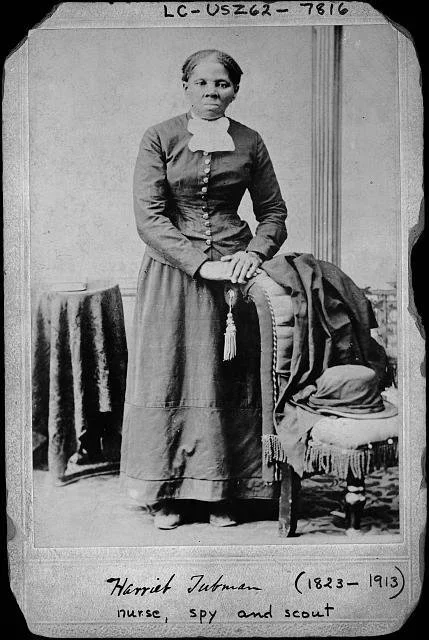Mental Health Strategies We Can Learn from Harriet Tubman
By Sabriya Charles, Founder of Project Passport
“I have heard their groans and sighs, and seen their tears, and I would give every drop of blood in my veins to free them.” – Harriet Tubman
Abolitionist and Underground Railroad conductor Harriet Tubman sacrificed to ensure that others did not have to endure the perpetual suffering she experienced in her life. Living with death and risk, Tubman always rose to the occasion, finding purpose and passion in healing the lives of others.
Tubman, a beacon of resilience and strength, shows what we can learn from her story. In a world where our mental health is challenged constantly, we can learn from her journey and apply it to our struggles today.
As one of the most famous Underground Railroad conductors, Tubman saved more than 60 people from slavery over 10 years. Her last rescue happened in 1860.
Tubman’s life embodied what it meant to use your resources, tap into one’s community for support, and stay the course despite the storm.
Not only did she deal with the risks of freeing slaves, but she also had to cope with her fears, anxieties, and obstacles. She used songs to soothe her soul or indicate danger, being inspired by her visions from God and using the resources at hand to rise from the ashes.
Resilience in the Face of Adversity
Tubman is seen posing for a portrait sometime between 1871 and 1876, expression neutral while she rests her hands on a chair.
As a child, Tubman was severely injured when her slave overseer threw a lead weight at her head. A saw was used to cut her head to relieve the pain. It became a difficult, traumatic brain injury that impacted her quality of life. Her injury resulted in her having visions that showed a path out of slavery.
Tubman visualized and manifested before it was even a thing during her life. She would dream of herself floating high above the fields, over rivers, and away from her circumstances, seeing visions of a better life. She dreamed of ladies saving her from slavery and realized she could be the savior. These visions motivated her to take risks and believe her life could be different.
Tubman used these visions and dreams to cope with her present. We can dream not only in our sleep but also when we are awake when we are willing to spend time meditating on what may come.
The Power of Community Support
Artist Credit: Kolongi Brathwaite
Tubman often had to seek the support of co-conspirators during her perilous journeys on the Underground Railroad. Trusting strangers required a strong level of intuition for her, especially with white people who put their own lives at risk to help. It was friends, including abolitionist and orator Frederick Douglas, who helped her continue to free slaves; these people helped her stay on her toes as slave hunters closed in.
Tubman’s willingness to seek help reminds us of the importance of collaboration to reach our life goals. For Black people, it is considered honorable to figure out situations on our own. Yet the level of pressure and stress that causes can lead to depression and isolation.
Even one of the greatest women in history realized she needed to trust and be open to honor her visions and goals. By seeking counsel from others along the Underground Railroad, she was able to ensure not only her survival but that of others. When we find ourselves in the dark about the next steps in our lives, we should remember our own safe spaces of community, such as calling friends, confiding in trusted family, or seeking professional help when necessary.
Spiritual Wellness and Faith
Tubman (on the far left) is photographed alongside her husband Nelson Davis, adopted child Gertie, and various other family members.
“...and I prayed to God to make me strong and able to fight, and that's what I've always prayed for ever since." -Harriet Tubman
Faith was key for Tubman, allowing her to push through her journey. She constantly turned to God, as she saw him as the hero of her troubles. Many times, therapists ask clients about their relationship with spirituality. Regardless of the nature of one’s belief systems, it is about the willingness to tap into something beyond you to cope with aspects of life you cannot control.
There were times during Tubman’s journey when she faced a crossroads of situations she could not control, such as when she tried to rescue her first husband from slavery. He refused to leave and eventually remarried. While this devasted her, she looked to God to heal and move on. Later, she remarried and found love again.
Spiritual practices, including meditation, prayer, and connection with nature, are impactful ways we can fortify our mental well-being. There are often things in life that are beyond our control. It can be freeing to give our troubles over to a higher power, as miracles can happen.
Tubman died on March 10, 1913, at the age of 91. She was a Union Army leader, an abolitionist, a visionary, a savior, and a believer. Her legacy reminds us just how important our mental resilience can be in navigating off the beaten path.
“I was conductor of the Underground Railroad for eight years, and I can say what most conductors can't say — I never ran my train off the track, and I never lost a passenger.” – Harriet Tubman
While Tubman’s journeys were rough, and she wanted to free many more slaves, she celebrated her accomplishments by sharing her stories and honoring her experiences. Her timeless wisdom is something we can continue to learn from as we navigate a modern world still fraught with terrors, racism, and pain -- all things that can take us down if we let them. Life’s journey can feel like the rockiest of paths, but our ancestors remind us daily that a way exists even when it is unclear.
About the author:
Sabriya Charles (Dobbins), award-winning Founder of Project Passport and the therapy practice, Fruits of Freedom Counseling. She specializes in proactive wellness to provide preventative mental wellness tools and solutions to companies, organizations, and individuals. After experiencing severe anxiety and panic attacks, she realized there needed to be a sacred space to help people with the “little things” before they become big things that result in breakdowns. Sabriya is the author of the wellness blog Living Life Full Force and of the book, Purpose Doesn’t Care What’s in Your Bank Account. She has certifications in Positive Psychology, Cognitive Behavioral Techniques Coaching, Neurolinguistics Practitioner-style Coaching, and many other disciplines. As a traveler to various places around the world, she believes that adventure can meet well-being if intentional work is done.




